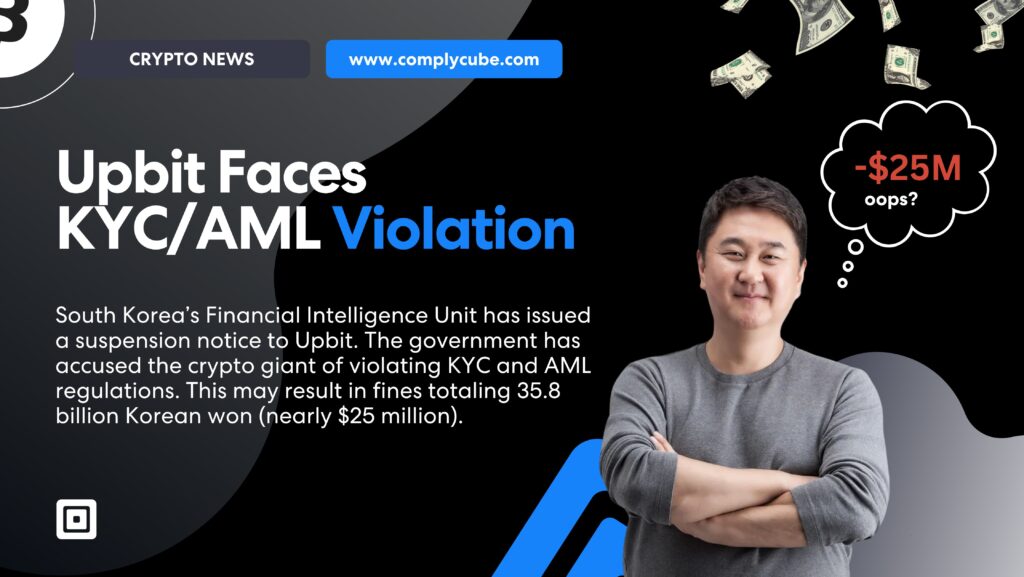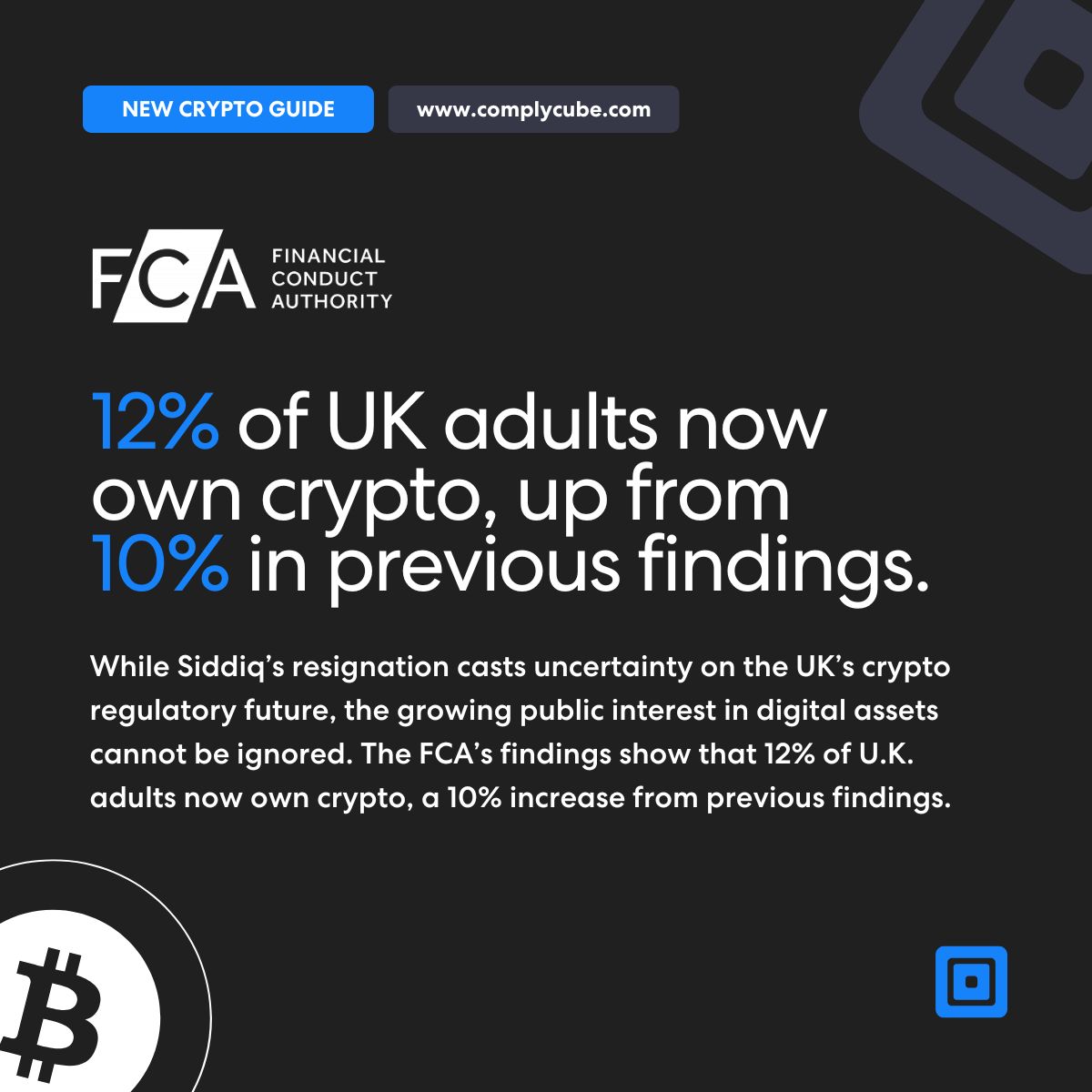👋 Welcome back to CryptoCubed!
In this issue, we highlight Binance India’s latest policy update, marking a significant step toward enhanced KYC procedures as part of the exchange’s efforts to meet stricter AML standards. Meanwhile, across the globe, regulatory scrutiny intensifies with notable updates from South Korea, Australia, and the U.S., where companies like Upbit and Block Inc. face serious compliance challenges. Buckle up, it’s time for CryptoCubed.

Binance India Levels Up in KYC Compliance
On April 18th, Binance announced a significant policy update requiring all users in India, both new and existing, to complete a full re-verification of their Know Your Customer (KYC) details. This move aligns with the exchange’s broader efforts to comply with India’s anti-money laundering (AML) regulations and strengthen platform-wide security protocols.
The company emphasized that this policy is grounded in legal and regulatory requirements set by Indian authorities. Users will be asked to provide updated identification information as part of the re-verification process.
To address privacy concerns, Binance reassured users that only essential data would be collected and that it would be protected under strict security standards. The exchange reiterated its commitment to combating financial crime and fostering a secure, responsible digital asset environment.

This development comes amid a tightening regulatory landscape in India, where all registered crypto platforms—whether domestic or international—are expected to follow similar compliance measures. Binance highlighted its official status in India:
Binance is registered with the Financial Intelligence Unit-India and adheres to Indian AML legislation. This includes obtaining your PAN details as part of our KYC process, which is a requirement under the Indian AML laws.
India’s Permanent Account Number (PAN), a unique 10-character alphanumeric code issued by India’s Income Tax Department, is mandatory for individuals and entities conducting financial transactions in the country. Binance clarified that this requirement is not exclusive to its platform but applies universally to all exchanges operating under Indian AML regulations.
For more on this story, click here.
Upbit Faces Suspension Over KYC/AML Violation in South Korea
South Korea’s Financial Intelligence Unit (FIU) has issued a suspension notice to Upbit. The government has accused the crypto giant of violating KYC and AML regulations. This may result in fines totaling 35.8 billion Korean won (nearly $25 million).
In addition, the exchange’s license renewal has actually been on hold since late 2024, with South Korean authorities stating that they need more time to thoroughly investigate a number of suspected violations before concluding whether or not they should be granted the license.

Shockingly, the exchange accounts for 70% of South Korea’s digital asset trading volume, showing the business’s significance and dominance within their crypto market. This further underlines the need for adequate KYC controls, as Upbit sets its national standard.
For more information, click here.
AUSTRAC Taskforce Flags Weak Anti-Money Laundering Controls Among Australian Crypto ATM Operators
A task force established by the Australian Transaction Reports and Analysis Centre (AUSTRAC) has raised concerns that some cryptocurrency ATM providers may not be implementing proper Anti-money Laundering and counter-terrorism financing (AML/CTF) safeguards.
In December of 2024, Brendan Thomas launched the Australian Transaction Reports and Analysis Centre (AUSTRAC), an internal task force in Australia to ensure regulatory enforcement and transaction intelligence. The task force has been focusing on AML and terrorist financing risks presented by crypto ATMs, also called “crypto kiosks”.
The taskforce has been busy engaging with businesses to understand the risks in their sector and assess their compliance with the law. It has identified worrying trends and indicators of suspicious activity, including transactions that may be linked to scams or fraud. ~ Brendan Thomas
Australia now leads the Asia-Pacific region in the number of crypto ATMs. What began as a niche service has seen explosive growth—from just 23 machines in 2019 to over 1,600 in operation today. These kiosks, primarily installed by digital currency exchanges, are heavily used for depositing cash to purchase Bitcoin.

With such rapid expansion, AUSTRAC is placing greater scrutiny on how these machines are managed and whether they could be exploited for criminal purposes.
For more on this, click here.
Trump Expands Presidential Pardon Power to Include Corporations, Pardoning BitMEX
In an unprecedented move, President Trump has extended the power of presidential pardons to include corporations, a decision that has sparked significant controversy. Traditionally, presidential pardons have been used to grant clemency to individuals convicted of federal crimes, but this expansion could have far-reaching implications for corporate accountability in the United States.
Corporations, legal entities designed to maximize shareholder profit, can theoretically commit crimes and face legal repercussions, as outlined in a 1999 memorandum from the Justice Department. This memorandum emphasized that prosecuting corporations for crimes, especially those with the potential for public harm, such as financial fraud, has significant public benefits, including deterrence on a large scale.
However, these principles are now being called into question after President Trump pardoned BitMEX, a cryptocurrency company that has faced serious charges related to financial misconduct. The company, which operates as a cryptocurrency exchange offering derivatives tied to assets like Bitcoin, has been at the center of a legal storm for its failure to comply with anti-money laundering (AML) regulations.

In August 2020, BitMEX admitted to violating the Bank Secrecy Act by operating without a proper AML program. The company was found to have allowed customers to trade anonymously before implementing any robust verification processes. This failure to prevent illicit activity led to a $100 million criminal fine, in addition to $130 million in civil penalties imposed by the Commodities Futures Trading Commission (CFTC).
Trump issued full pardons to four individuals and BitMEX, effectively wiping out both the criminal penalties and the legal consequences related to the company’s actions. With the pardon, BitMEX is immune from any future federal prosecutions for crimes covered by the pardon, even if new violations are uncovered.
By pardoning BitMEX, Trump has effectively set a new precedent that corporations engaged in serious financial crimes, particularly in the cryptocurrency space, may be exempt from accountability under his administration. This sends a troubling message to the financial world: major companies involved in illicit activities may be able to avoid legal consequences if they are politically connected.
Find more on this story here.
Cash App’s AML Shortcomings Lead to a $40 Million Fine
Block Inc., the parent company of Cash App, has agreed to pay a $40 million penalty following a regulatory investigation into significant lapses in its anti-money laundering (AML) compliance program.
On Thursday, April 10, the New York Department of Financial Services (NYDFS) announced a penalty, stating that it followed the discovery of “significant failures” in Block’s Bank Secrecy Act/anti-money laundering (BSA/AML) compliance program.

In addition to the financial penalty, the company must appoint an independent monitor to conduct a thorough assessment of its compliance with NYDFS regulations. The department noted that Block Inc. cooperated fully with the investigation and has “already committed significant financial and other resources” to address the issues identified.
The business stated, “This is an enduring effort. We are committed to continued investment in safety and full compliance with both the letter and the spirit of the law as our program continually evolves.”
For more on this story, click here.
Over 30% of Wealthy Koreans Prefer Crypto as a Long-Term Wealth Strategy
New data highlights a growing trend in South Korea, where over 30% of wealthy investors are increasingly turning to cryptocurrency for long-term value growth, surpassing traditional assets like gold and real estate.
According to a recent report by Hana Bank, South Korea’s major financial institution, younger investors in particular are showing a marked preference for digital assets. The bank’s think tank suggests this shift could be more than just a short-lived trend, signaling a potential change in investment patterns, particularly as conventional financial systems fail to meet the expectations of the younger generation.

The report suggests that if digital assets gain official status as a financial investment product and are recognized for settlement purposes, it could pave the way for a new financial order. While the report stops short of predicting crypto as the future of finance, it emphasizes the increasing likelihood of a paradigm shift in the financial landscape.
The data paints a revealing picture. Over 70% of South Korea’s affluent investors, those with more than 10 million won (approximately $7,000), have now invested in cryptocurrency, an amount that is more than twice as high as the average investment in other asset classes.
For more on this story, click here.
ComplyCube’s Crypto Guides: Staying Ahead of the Sector
Stay up-to-date with everything Crypto on the ComplyCube website, with relevant guides that can help your business stay crypto compliant. Here’s an excerpt from our recent piece, “Understanding UK Crypto Regulation in 2025.”
Understanding UK Crypto Regulation in 2025
As the US spearheads the global crypto surge, the future of UK crypto regulation remains uncertain. Tulip Siddiq, the U.K. Treasury Minister and a prominent advocate for cryptocurrency regulation, has resigned, leaving the nation with questions over the future of crypto in Britain. Meanwhile, the FCA reports that 12% of UK adults now own cryptocurrency, a clear indication that Britain is eager to avoid being sidelined as America embraces its new financial frontier.

The FCA’s crypto roadmap was first released in 2023, marking the regulator’s approach to stabilizing the sector’s growth. The roadmap outlines some clear focuses for the FCA, including consumer protection, market integrity, and Anti-money Laundering (AML) measures.
However, critics argue that the U.K. risks falling behind global competitors if it does not accelerate the implementation of these regulations. As one recent opinion piece in The Fintech Times pointed out, the pace of regulatory development is critical as nations like the U.S. and the European Union push ahead with their own crypto frameworks.
Read the full piece here.
Time for Some Light-Hearted Creative Criticism?
So you’ve made it to the end of our newsletter. It’s time to enjoy a little satire, worthy reader, you’ve earned it.
🔥THE CRYPTO CUBED POEM: APRIL🔥
This month, a controversial presidential pardon was agreed,
As Trump loves BitMEX’s imaginary AML and KYC.
South Korea goes crazy for crypto as a long-term strategy,
As their Crypto giant Upbit faces millions for acting nastily.
When it comes to crypto, one thing is for sure,
No one seems to give a damn about the law.
Block Inc.’s founder thought he could sidestep every rule,
Another million-dollar fine, and another cryptocubed fool.
Stay tuned for our May newsletter, and have a great month!




